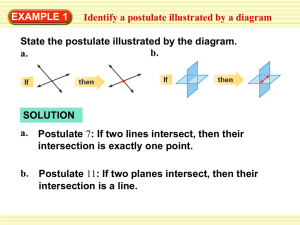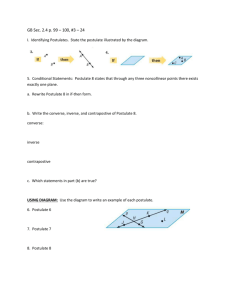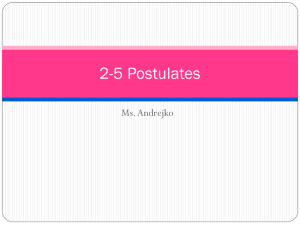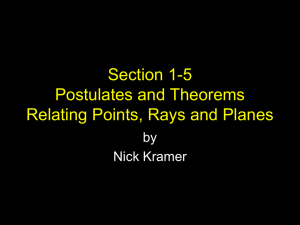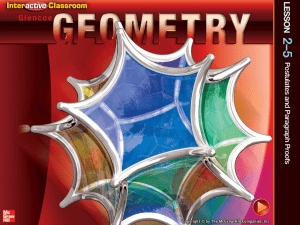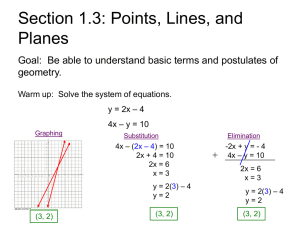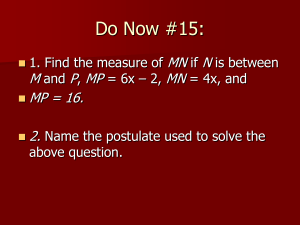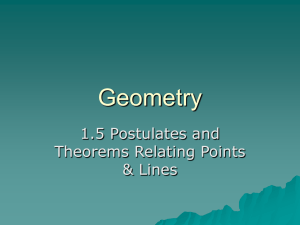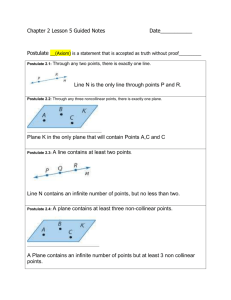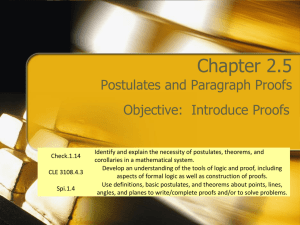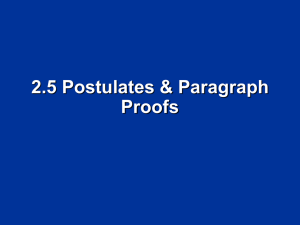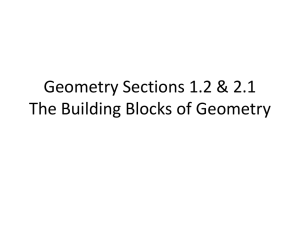Postulate
advertisement
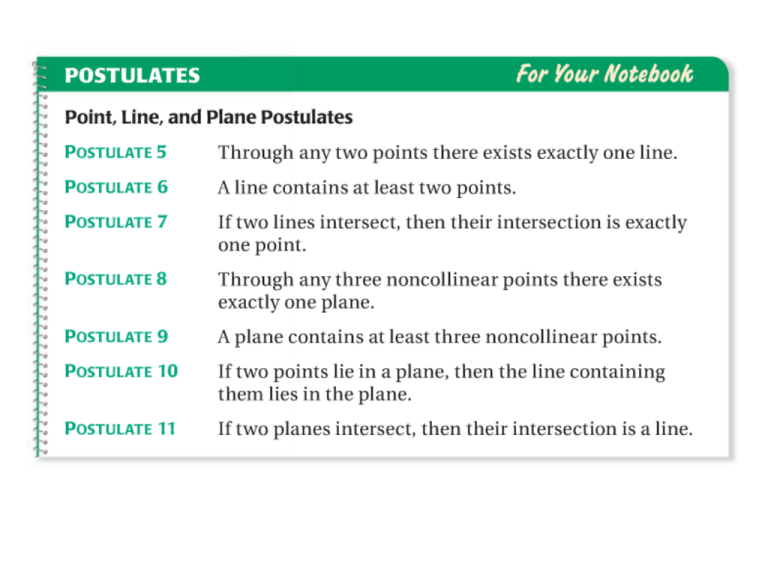
EXAMPLE 1 Identify a postulate illustrated by a diagram State the postulate illustrated by the diagram. b. a. SOLUTION a. Postulate 7: If two lines intersect, then their intersection is exactly one point. b. Postulate 11: If two planes intersect, then their intersection is a line. EXAMPLE 2 Identify postulates from a diagram Use the diagram to write examples of Postulates 9 and 10. Postulate 9: Plane P contains at least three noncollinear points, A, B, and C. Postulate 10: Point A and point B lie in plane P, so line n containing A and B also lies in plane P. GUIDED PRACTICE for Example 1 and 2 1. Use the diagram in Example 2. Which postulate allows you to say that the intersection of plane P and plane Q is a line? ANSWER Postulate 11 GUIDED PRACTICE for Example 1 and 2 2. Use the diagram in Example 2 to write examples of Postulates 5, 6, and 7. ANSWER Postulate 5 : Line n passes through points A and B Postulate 6 : Line n contains A and B Postulate 7 : Line m and n intersect at point A EXAMPLE 3 Use given information to sketch a diagram Sketch a diagram showing TV intersecting PQ at point W, so that TW WV . SOLUTION STEP 1 Draw TV and label points T and V. STEP 2 Draw point W at the midpoint of TV Mark the congruent segments. STEP 3 Draw PQ through W. EXAMPLE 4 Interpret a diagram in three dimensions Which of the following statements cannot be assumed from the diagram? A, B, and F are collinear. E, B, and D are collinear. AB plane S CD plane T AF intersects BC at point B. SOLUTION No drawn line connects E, B, and D, so you cannot assume they are collinear. With no right angle marked, you cannot assume CD plane T. GUIDED PRACTICE for Examples 3 and 4 In Questions 3 and 4, refer back to Example 3. 3. If the given information stated PW and QW are congruent, how would you indicate that in the diagram? ANSWER GUIDED PRACTICE 4. for Examples 3 and 4 Name a pair of supplementary angles in the diagram. Explain. ANSWER In the diagram the angle TWP and VWP form a linear pair So, angle TWP, VWP are a pair of supplementary angles. GUIDED PRACTICE 5. for Examples 3 and 4 In the diagram for Example 4, can you assume plane S intersects plane T at BC ? ANSWER Yes GUIDED PRACTICE 6. for Examples 3 and 4 Explain how you know that AB BC in Example 4. ANSWER It is given that line AB is perpendicular to plane S, therefore line AB is perpendicular to every line in the plane that intersect it at point B. So, AB BC Daily Homework Quiz 1. For use after Lesson 2.4 Use the diagram to write an example of Postulate 7. ANSWER Line m intersects line n in point F and no other point. Daily Homework Quiz 2. For use after Lesson 2.4 Decide whether the statement “Two planes can intersect in exactly one point R” is true or false. If false, give a reason. ANSWER False; Postulate 11 says that if two planes intersect, their intersection is a line. Daily Homework Quiz For use after Lesson 2.4 Use the diagram to determine if the statement is true or false. 3. The intersection of planes M and N is points B, E and H. ANSWER false Daily Homework Quiz For use after Lesson 2.4 Use the diagram to determine if the statement is true or false. 4. GH lies in plane M. ANSWER true Daily Homework Quiz For use after Lesson 2.4 Use the diagram to determine if the statement is true or false. 5. ABE and ANSWER false HED are vertical angles.
